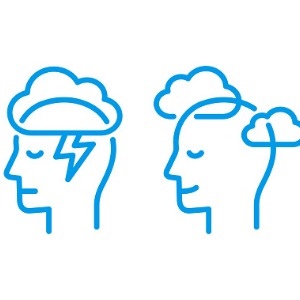
Feeling down and out (sometimes) is a normal part of life. But if you feel like this continuously and for more than two weeks, to the extent that it affects your work or social life, you may be at risk for a relapse.
Common red flags of a depression relapse:
- A loss of interest in activities you usually enjoy, like hobbies or hanging out with friends.
- Feeling low, sad, empty and hopeless most of the time.
- Avoiding social gatherings and purposefully losing touch with friends.
- Exhaustion all the time, even after doing simple things.
- Sleeping much more or less than you usually do.
- Feeling worthless or guilty about past or current events.
- A loss of or increase in appetite.
- You’re easily annoyed or irritated.Possible reasons include family conflict, relationship changes (e.g. a break-up) and grief. Other triggers could be that you didn’t fully recover from your last episode of depression or you stopped your treatment too early. Like many mental health conditions, depression has a high rate of relapse. This means, if you feel yourself taking on a downward spiral back into depression, you need to take steps to step on the brakes.
Stop the downward spiral
Recognise a relapse
Once you understand the symptoms of a relapse, it’s time to deal with them. Be aware of your negative thought patterns as they cause you to spiral. Write down your thoughts and feelings throughout the day. This will allow you to observe your thoughts and feelings, rather than you actively engaging in negative thoughts. With time, you can step back and see your thoughts for just that.
Check yourself
If you find yourself concentrating on bad outcomes of a situation or feeling that something is dire or catastrophic, take a deep breath and ask yourself if your thought process is logical. Ask yourself specific questions like: “Is this really the end of the world or is this only unpleasant for now?” or “What are possible positive outcomes of this situation?” By challenging your negative thoughts and allowing yourself to look beyond the bad, you’ll be able to see the positives in time.
Have faith in yourself
Remind yourself that you beat depression once and you can stop it this time around. Reflect on what you’ve accomplished post-depression and use that to fuel your strength. Whether you’ve achieved better grades or just manage to socialise more, you’ll find comfort in remembering that you’ve made it through difficult times.
If things get worse
If you try all these techniques and still feel yourself heading to a relapse:
- Tell your loved ones how you’re feeling and mention the warning signs to look out for.
- Talk to your doctor and prepare for a relapse. This is important so you can work out a strategy if you are relapsing. Your doctor may refer you to a mental health specialist.





 Publications
Publications
 Partners
Partners










